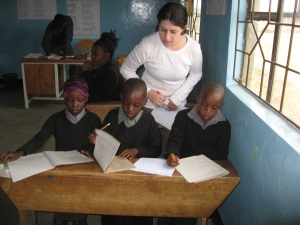 Jeanette Weisflog USA, – Kenya
Jeanette Weisflog USA, – Kenya
“Although my time in Nairobi was short lived in that I was only there for one week, VCC made it possible for me to have one of the most amazing, challenging and rewarding experiences of my life.
The VCC team was absolutely reliable and I was able to volunteer at a local orphanage during my week of stay. The logistics and planning was taken care of to the fullest extent and the Nairobi director Zaby and I spoke on a daily basis about how my days at the orphanage had went! I would definitely recommend this organization to others who may be searching for a volunteer experience in Kenya, but are unsure about which NGO to go through to organize it! Thank you VCC.- Jeanette”
Kelly Scottland – Kenya
“I had an absolutely fantastic time in Nairobi. It is some “unlife like” place i dream about virtually every day. It has shaped my values and beliefs and turned me into a more assertive person. I have developed stronger views on trivial everyday things that I didn’t give much thought before the trip. I also feel that, because Kenya is the furthest I’ve been on a plane, the world has opened up for me, and anywhere seems accessible in the future. ”
Mike UK – Kenya
There are many things that I can take back from my experience in Kenya. I have never had a job where I felt more appreciated than while I worked. Kenyans themselves are fiercely proud of their culture and history, with their own unique language, food, calendar, time, and holidays. The people also show a great deal of respect and camaraderie with one another. It has been a pleasure immersing myself in Ethiopian culture, (especially over round after round of delicious coffee!) and I am looking forward to seeing all my new friends very soon.
Mrs Jones, Kevin Jones’ mother (Kenya Volunteer)
“Many thanks for your assistance in making this a smooth process. It is always a worry …more so for us as parents than for Kevin himself!! And you have always answered our queries quickly and efficiently”.
Laura Buck (USA) Nairobi, Kenya
Laura is back from Nairobi. She had a fantastic time. This trip turned out better than I had ever hoped for. We can’t thank you enough for all your help. What a great organization Volunteer Capital Centre is! The orphanage wrote a beautiful letter to Laura at the end of her stay thanking her for her contributions. We were really touched by his gratitude and sincerity. Laura plans on staying in touch with him and trying to help the kids. She belongs to a club at her high school that exists solely to raise money for charitable organizations. Laura can’t wait to show them pictures of the orphanage and the awesome kids she got a chance to work with.
Sandra Rzeszutko (USA) Kenya
I thoroughly enjoyed the program and was received and taken care of with open arms and prompt contact when needed. Kenya is a wonderful country, I enjoyed the weather immensely and was impressed with the beautiful scenery and wonderful people. My host family was perfect; I grew to care for them all very deeply and hope to see them again someday. Culturally, I found the small town I lived in to be lacking in modern technology such as running water (we used a well) and that few people had refrigerators. I must confess I had doubts about being able to cope, but within 24 hours I was totally comfortable, due mostly to my host family and the town residents. Everyone was friendly and I was greeted by all. Despite originally visiting Kenya for wildlife, I must say I was most impressed with the people of Langata. They are extremely hard working, very proud and considerate of others. I was humbled by how few amenities they had yet they live contented in what I considered to be hardship. I learned to love seeing simple things like women hand washing clothes, carrying babies on their back and old men gathered for a game of checkers. My next visit will be people oriented (women’s issues, orphaned)
Follow us on twitter @vccorg











